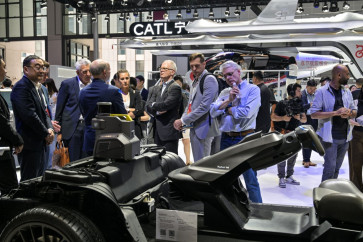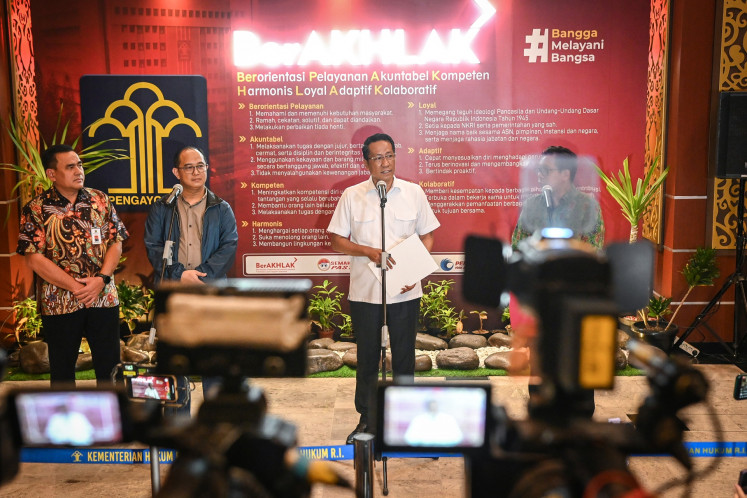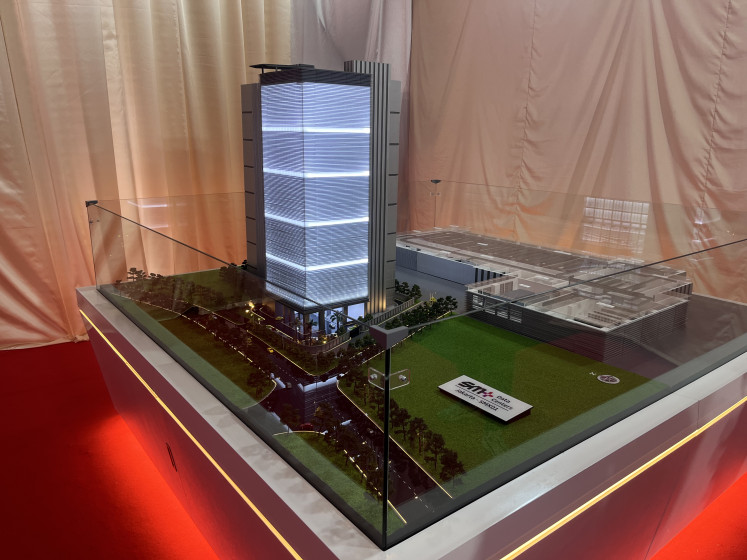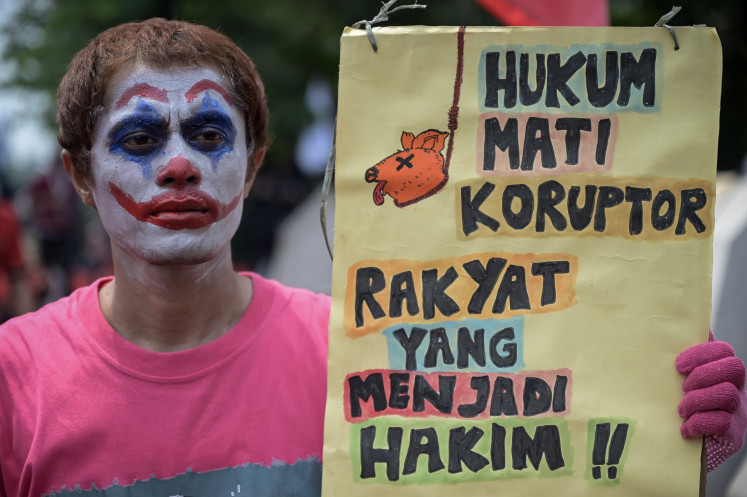Popular Reads
Top Results
Can't find what you're looking for?
View all search resultsPopular Reads
Top Results
Can't find what you're looking for?
View all search resultsHyundai Motor attempts to reach new levels
Just like its expansive export of Korean pop culture, South Korea carmaker Hyundai Motor Corporation (HMC) has also extensively expanded its market worldwide with new and sleek models
Change text size
Gift Premium Articles
to Anyone
J
ust like its expansive export of Korean pop culture, South Korea carmaker Hyundai Motor Corporation (HMC) has also extensively expanded its market worldwide with new and sleek models. Although Indonesia is not its biggest market, Hyundai is still eying Southeast Asia’s largest economy as the potential site for its factory outside Korea. To see how Hyundai answers challenges in the global automotive market, PT Hyundai Mobil Indonesia (HMI) invited several journalists, including The Jakarta Post’s Irawaty Wardani to visit the company’s headquarters in Seoul. Below is the report.
In the past five years, Hyundai has launched numerous models — ranging from small sedans such as i10 to large MPV of H-1 — that gained a lot of attention from automotive customers, including in Indonesia.
As the local automotive market hit a remarkable milestone last year by achieving record sales of 764,710 units, carmakers are hoping that production can reach up to one million cars in the foreseeable future.
Such optimism, however, has yet to ensure that Hyundai will set up a plant in Indonesia.
“We are continuing to study a number of places in Southeast Asia, but we haven’t made any decisions yet,” said Hyundai’s Global PR team director Frank Ahrens.
HMI president director Jongkie D. Sugiarto said in March 2009 that HMC would consider developing a production base in an ASEAN country, with Indonesia and Vietnam as the most probable candidates. However, HMC must take into consideration the tax system, regulations and human resource capabilities in the candidate countries.
To date, Hyundai only has a completely knocked down (CKD) assembly line in Bekasi, West Java. The Rp 40 billion (US$4.4 million) facility is currently manufacturing the H-1 — and its XC, Elegance, Classic and PIV (Personal Image Vehicle) variants — for both domestic and ASEAN markets.
“Once we start building a plant we can build it fast, but we have to take this decision very seriously because at the bottom of all of this is once again the quality that we try to develop and maintain,” he said.
Currently, Hyundai’s market share in Indonesia is less than 1 percent, but Ahrens said that should not keep Hyundai from developing a plant in the country.
“Indonesia is a great market with a large population and a stable government. However, the question is how to get inside [the country],” he said, considering there are still some barriers with business permits to develop a plant.
According to Y.K. Koo, HMC Director for Asia-Pacific and the Middle East, the ASEAN market has yet to favor of Korean-made cars.
“We have built different models to meet our customers’ demands that still give [import] profit for Hyundai,” he said.
Since the most favored models in Indonesia are hatchbacks and seven-seaters, HMI is focusing its sales in Indonesia on small hatchback sedans such as the i10, i20 and Grand Avega.
Koo explained that Hyundai was still focused on its biggest markets in North American and Europe. Through its European Hyundai Motors, established in 2001, Hyundai developed the i30 model to appeal to European customers.
Starting in 2002, Hyundai set its sight back on the Asian market by establishing its plant in Beijing.
In 2005, Hyundai launched its US assembly plant in Alabama — 20 years after it first set foot in America through its Excel model.
All the works to improve the cars’ quality while expanding the global market paid off in 2009 when the Hyundai Genesis was named the 2009 North American Car of the Year and became the first Korean car to receive the prestigious award.
The global expansion can be seen from Hyundai’s moves by opening its plants in St. Petersburg, Russia, and its third plant in China — both in 2010. Today, Hyundai is constructing a new plant in Brazil to penetrate the market in Latin America.
Globally, Hyundai’s sales have increased over the past five years.
“In 2010, our global sales rose by 16.3 percent compared to a year earlier. We sold 3.61 million cars worldwide,” Ahrens said.
Despite the rosy picture, Hyundai faces its biggest threat from Kia — the company it saved in 1998 — in the domestic market.
Reuters reported that Hyundai’s domestic market share tumbled 5.4 percentage points to 45 percent last year from 2009, while Kia’s share rose 3.5 percentage points to 33 percent.
Kia’s global sales jumped 52 percent from 2008 to 2010 to 2.1 million units while Hyundai’s grew 30 percent to 3.6 million.
Counting on its Research and Development Center in Namyang, about 40 kilometers southwest of Seoul, Hyundai develops its cars including the most-anticipated Veloster. The Veloster was revealed at the Detroit Motor Show earlier this year. What makes the car different is that Hyundai tries to combine the look of a coupe and a sedan into this car.
For Hyundai, which was established 44 years ago by Chung Ju-yung, the year 2000 was a turning point after the carmaker launched its quality management initiative.
Long known as a value car, Hyundai began to overhaul its image in an attempt to establish itself as a world-class brand.
“We learned our lesson earlier in our career of trying to make too many cars,” Ahrens said.
He added that one of the lessons from its Japanese competitors over the past decades was that Hyundai was trying to expand too fast.
“When you try to expand too fast, you are going to lose control of your quality. We are not going to do anything that’s going to sacrifice our quality.”










